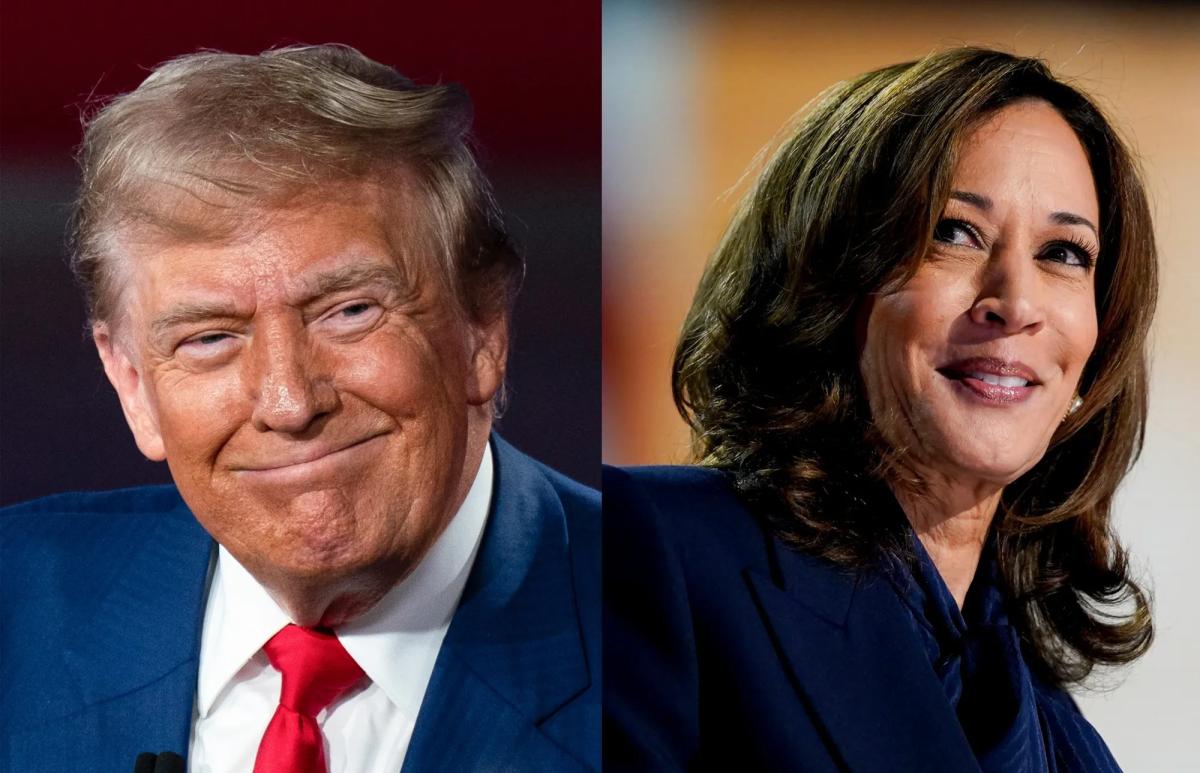Vice President Kamala D. Harris: Democratic Nominee for President
Birth date: October 20, 1964 (age 59)
Birthplace: Oakland, California
Party: Democrat
Spouse: Douglas Emhoff
Education: University of California, Hastings College of Law (J.D.), Howard University (B.A.)
Former offices: US Senator for California (2017–2021); Attorney General for California (2011–2017); District Attorney for San Francisco (2004–2011); Deputy District Attorney, Alameda County
Campaign Platform
On August 3, Vice President Kamala Harris officially secured enough delegates to become the Democratic nominee. Her rise to the position as the presumptive nominee came as a surprise when President Joe Biden announced he would no longer be running for reelection and simultaneously endorsed Harris for president instead. While this announcement instantly changed the political landscape, Harris is no stranger to the campaign trail—in January 2019 Harris announced her candidacy for president of the United States in the 2020 election but ended it eleven months later.
After Biden endorsed Harris, key elected members and influential voices in the party immediately began to coalesce around the presumptive Democratic nominee, flooding the media and social media with endorsement statements. From a financial standpoint, campaign donations saw an immediate boost, with the Harris campaign raising record breaking funds ($310 million in July) following the announcement.
As Election Day grows closer, Harris’ policy positions have solidified—though she’s received plenty of criticism from activists who believe her positions from 2020 to 2024 as the Democratic nominee are too different to be compatible. President Biden and Harris hold similar stances on key political issues, but there are variations on a few issues. For example, President Biden’s proposal to tax corporations is at a higher rate than Harris’ and her border policy is a natural, tougher evolution than the incumbent’s. Harris also has issued a more forceful statement on both supporting Israel’s right to defend itself against attacks, and the Palestinian people’s right to self-determination.
Harris selected Tim Walz, Governor of Minnesota, as her running mate. Learn more about Governor Walz’s background here.
Policy Positions
1. Tax and the Economy
Harris rests her agenda on what she refers to as the opportunity economy, a bundle of reforms designed to make it easier for working- and middle-class families to live.
Tax: While supporting cuts to taxes for individuals and families, Harris is expected to support an increase in the corporate tax rate up to 35%—the existing rate before Trump reduced it to 21% with the 2017 Tax Cuts and Jobs Act.
Affordable Housing: Kamala Harris wants to make housing more affordable, especially to first time home buyers, incentivize cities to build more multi-family housing, open up federal lands for residential development and provide tax incentives to builders who build what are generally referred to as “starter homes” for first time buyers. Harris also wants to give first time homebuyers up to $25,000 in down payment support and deny tax benefits to investors who buy many single-family homes and use them as rental property.
Consumer Debt: As vice president, Harris has been a champion for eliminating barriers to financial freedom for Americans, such as medical debt and student loans. She has promoted the Biden administration’s student loan forgiveness efforts, which have forgiven more than $168 billion for nearly 4.8 million borrowers.
Minimum Wage: Harris has called for raising the minimum wage but has not said how high she’d like to raise it.
Federal Reserve Independence: Harris has insisted on fed independence saying that, “As president I would never interfere in the decisions that the [Federal Reserve] makes.”
Key Takeaway: Harris has built an economic agenda that is designed to address the side effects of the larger economic issues that have been prevalent in the nation for years, like housing affordability, debt, and tax burdens on middle class families. However, none of the policy proposals can directly impact inflation—that remains the purview of the Federal Reserve.
2. Trade
Harris is likely to maintain the Biden administration’s approach to global trade, seeking multilateral trade policies that are firmly against China, but diplomatic in tone. Harris is likely to continue the Biden stance against China, that is generally considered to be an extension of the Trump Era policies, designed to be pro-American worker, protecting consumers from intellectual property theft, and provide market access to the Chinese market.
Harris is expected to continue Biden’s proposal that bans Chinese connected vehicle technology in order to fight off the onslaught of cheap Chinese EVs that have become more popular in the auto industry. She’s also expected to pursue a multilateral approach to trade, seeking partnerships to counter Chinese aggression and ways to diversify the supply chain.
Harris has long promoted a “worker-centric, green-friendly, economically literate” trade policy. She has harshly criticized the steep tariffs imposed during the Trump presidency on imports from China. Harris has communicated her support for the maintenance of the capitalistic value of competition while “evening the [economic] playing field.”
One of the largest trade agreements, USMCA is up for renegotiation in 2026, and Harris has vowed to ensure the agreement is beneficial to the American worker (both Mexico and Canada have said the same thing). This tilt toward an aggressively more “American worker stance” isn’t just with the executive branch—a Congress controlled by either house is unlikely to ratify any agreement or treaty that is to the contrary.
Key Takeaway: Harris is expected to continue the Biden approach to trade, focusing on unilateral agreements to counter Chinese aggressiveness and encourage US manufacturing. This includes negotiations in APAC and in North America—especially the upcoming USMCA agreement.
3. Artificial Intelligence & Tech Regulation
AI & Tech: Vice President Harris wants the United States to be the lead in Global AI competition while balancing regulation at home. Many assume Harris, as a former California Senator, would have a softer stance on tech due to her Silicon Valley connections. Harris has deep relationships with tech leaders, meaning they will continue to play a role in how AI policy is developed in a Harris administration. But that is only half the equation: Congress needs to put in the work, too. However, Harris has been a key ambassador of the Biden AI Doctrine, a manifesto designed to balance regulation and drive competitiveness.
Anti-Trust & Tech Regulation: Under Lina Khan’s leadership, the Federal Trade Commission (FTC) has gone after several organizations in the tech sector for anti-competitive and monopolistic practices. The top cases involve some of the largest tech companies in the world—Google, Meta, Amazon, Apple—all organizations who also play a key role in policy development that seeks to regulate the industry. Harris has been vague on how she’d like the FTC to continue under her presidency, however, we know a few things:
- The regulatory momentum made under Biden and Khan’s FTC will be hard to stop.
- Congress will continue pushing to regulate the tech industry, especially in areas of child protection and privacy.
- Harris is concerned about price fixing, what the administration refers to as “junk fees”—mergers and acquisitions that might hurt consumers.
Tech watchers have noted that one of Harris’ longtime and closest advisors is Tony West (chief legal officer at Uber) and Google attorney Karen Dunn, both of whom have represented companies currently in the crosshairs of the regulatory landscape. However, Brian Deese (Biden’s first National Economic Council Director) and Rachel Brown (competition policy lead at the NEC) are also advising Harris and come from Biden’s team who have pushed for anti-competitive regulations.
Key Takeaway: Although Harris has strong relationships in Silicon Valley, it is likely that Harris will continue the balancing act Biden has pursued in his push to regulate big tech while attempting to drive American innovation abroad. It’s unclear how she’ll deal with anti-trust. However, pricing is a key (and popular) component of her electoral strategy.
4. Healthcare
Abortion: Harris is an ardent supporter of national abortion rights. She had vowed to codify Roe v Wade into federal law when elected president. While vice president, Harris visited a Planned Parenthood clinic in Minnesota (the first for a sitting vice president).
Affordable Care Act: Kamala Harris hopes to continue the momentum gained during the Biden Administration and continue to work to support and strengthen the Affordable Care Act. A key part of her platform in 2024 is to ensure access to health care – especially reproductive health care and preventative care, making them obtainable for all Americans.
Medicare: In October 2024, Harris released a new set of agenda items aimed at the "Sandwich Generation," including plans to expand Medicare coverage to help cover the cost of home health aides for seniors. She has also advocated for expanding Medicare drug price negotiations, which would not only benefit seniors but also help fund the costs of the expanded coverage.
Kamala Harris once supported Medicare for All, a program popular among Democrats during the 2020 primary. However, Harris had moved on from that position adopting the Biden Policy Agenda while Vice President.
Key Takeaway: With abortion rights gutted by the Supreme Court, expect restoring women’s reproductive rights to be front and center for her campaign. This is a prominent issue for the Democratic electoral base and VP Harris has already shown it to be a priority for her campaign.
5. Immigration
In her first year as vice president, Harris was tasked with addressing the root causes of mass migration from Mexico and the Northern Triangle of Guatemala, Honduras, and El Salvador. She travelled to Guatemala and Mexico and subsequently pulled together the Partnership for Central America, which has resulted in USD 5.2 billion in private sector investments in the region. Harris was criticized by progressives in her party when she told migrants, “Don’t come” to the United States, especially if they would be breaking the law.
Key Takeaway: A Harris administration will likely continue to take a comprehensive approach to immigration to address the issues at the border. The Trump campaign has already blamed Harris for the issues at the border and labelled her the “border czar.” Harris will need to effectively communicate how she plans to address immigration and the border crisis.
6. Climate Change
Climate Change & Civil Rights: Harris views climate legislation, clean energy policies, and sustainable development as tools to help disadvantaged individuals and communities. Harris also believes the United States must take significant action to fight climate change in the face of 100-year floods, wildfires, rising sea levels, and hurricanes. Harris as vice president announced grants of more than USD 1 billion to support states impacted by climate change.
Clean Energy: Harris was hugely influential in the passage of the Inflation Reduction Act, which provides funding to state, local, and tribal governments, NGOs, and other tax-exempt organizations to encourage their investment and support clean energy infrastructure in local communities. This support of clean energy is not expected to drastically change.
Drilling and Fracking: Harris says she would not ban fracking in the United States. Harris faces criticism for this from environmentalists.
Electric and Hybrid Vehicles: Harris would continue to push for subsidies for the electric and hybrid vehicle market, while combating what could be an industry threat from China.
Key Takeaway: Harris remains committed to the Biden administration’s whole of government approach to combatting climate change. Harris cast the tie-breaking vote in the largest climate investment in American history and was an original co-sponsor of the Green New Deal.
7. Foreign Policy
Israel–Hamas War: Harris has staunchly defended Israel’s right to self-defense while simultaneously highlighting the suffering of the Palestinian civilian population. Harris has been more outspoken than President Biden about the human rights concerns that have developed as Israel’s engagement in the region has increased.
China: Harris has been consistent through her political career in advocating for simultaneous “cooperation and competition” between the US and China, specifically regarding the economy and climate issues. Harris has been outspoken, however, about human rights issues perpetuated by China.
India: Harris is expected to maintain the long-standing mutually beneficial relationship between the US and India and seek a trade agreement.
Russia–Ukraine War: As a spokesperson for the Biden administration, Harris has been outspoken about Russia, specifically regarding its invasion of Ukraine. Vladimir Putin “endorsed” Kamala Harris for president, saying he would have preferred President Biden but, once Biden was removed from the race, Russia supports Kamala. Putin has also criticized President Trump for placing sanctions on the country. To be clear: Russia is simply trolling the United States.
Africa: African leaders have often been critical of the US government’s inclination to focus on foreign policy issues everywhere but on the African continent. Although President Biden has not yet traveled to Africa (he has a trip to Angola scheduled mid-October), Vice President Harris made trips focused on investing in African innovation. Harris sought to embrace several partnerships through bilateral meetings with governments in Ghana, Tanzania, and Zambia.
Key Takeaway: Harris’ foreign policy experience has been extensive. Over the four years she’s visited more than 20 countries and met with over 150 world leaders. Harris polls favorably with world leaders and has more approval abroad than she does in the United States. Harris will likely push for a more human rights centered foreign policy while pushing for diplomatic ties and indirect funding to push American power abroad.
Biography
Kamala Devi Harris currently serves as the vice president of the United States of America under President Joe Biden. She is the highest-ranking elected woman in American history as well as the first woman, the first Black American, and the first South Asian American to be elected to the position of vice president. Her decorated public service career spans decades, having held multiple high profile elected positions including senator, attorney general, and district attorney.
Before being elected vice president, Harris served as the junior senator from California where she focused on advancing legislation to fight hunger, provide rent relief, improve maternal health care, expand access to capital for small businesses, revitalize America’s infrastructure, and combat the climate crisis. As attorney general for California, Harris went toe-to-toe with Wall Street’s big banks to secure relief for homeowners who were foreclosed on during the Great Financial Crisis. The landmark case awarded California homeowners with a $20 billion settlement as opposed to the $4 billion the banks initially offered.
During her tenure as district attorney for San Francisco, she established the office’s environmental justice unit and created “Back on Track,” a groundbreaking program to provide first-time drug offenders with the opportunity to earn a high school degree and find employment, which the US Department of Justice designated as a national model of innovation for law enforcement.
Vice President Harris was born on October 20, 1964, in Oakland, California to immigrant parents of Indian and Jamaican descent. She is married to American attorney Douglas Emhoff, America’s first-ever second gentleman, and they have a large, blended family that includes their children, Ella and Cole.
For more on global elections in 2024, the EGA Election HQ is your guide to the moments that matter, what comes next, and what all of this means for industries and sectors. Sign up here to receive global election updates from the EGA Election HQ team. For counsel or to get in touch, reach out at: Elections@edelmanEGA.com.
This content offers a high-level synopsis of current events. It is intended to provide information only, not opinion, and is not representative of any specific EGA work.



